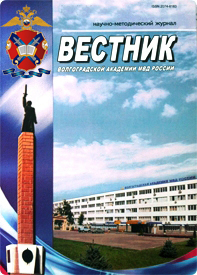In the article the authors defend the dialectical-materialistic methodology as a truly scientific approach, which is necessary in the criminal process due to the universality and universality of dialectical regularities themselves. Dialectical-materialistic methodology proceeds from reliable knowledge of the surrounding world, the theory of reflection, objective truth, which is achievable in the criminal process. This methodology, according to the authors, corresponds to an objectively true type (model) of the criminal process. The article criticizes the approach from the point of view of „pluralism of methodologies“ (each has its own „methodology“), which rejects materialistic dialectics, objective truth and affirms relativism: everything is relative, including the difference of truth from error, real from virtual probability from reliability, etc. This approach for the primary takes not objective reality (matter), but the sphere of consciousness in the form of „language reality“, gives priority not to objective proof, but sophistry to (competitively-winning) art of argumentation, the ability to be more convincing, stronger than its procedural opponent. The authors do not share the approach „There is no truth (objective). All humanitarian truths are subjective, for they are measured by a man“, since he does not take into account the actions of objective dialectical regularities that do not depend on man and mankind.
dialektiko-materialisticheskaya metodologiya, ob'ektivnye dialekticheskie zakonomernosti, teoriya poznaniya, teoriya otrazheniya, «plyuralizm metodologiy», ob'ektivnaya istina, formal'no-yuridicheskaya (pravovaya, sudebnaya) istina, «istina sil'neyshego», ob'ektivno-istinnyy tip (model') ugolovnogo processa, sostyazatel'nyy (vyigryshno-proigryshnyy) tip (model') ugolovnogo processa, «ob'ektivnaya real'nost'», «yazykovaya real'nost'», relyativizm, veroyatnost', dostovernost', istina, lozh', sofistika, pravdopodobie, kriteriy istiny, ubeditel'nost'
1. Vinogradova T., Grigorova D. Velikie lyudi, kotorye izmenili mir. M., 2016.
2. Eynshteyn A. Eynshteyn o religii. M., 2010.
3. Strogovich M. S. Kurs sovetskogo ugolovnogo processa. M., 1968. T. 1
4. Ul'yanova L. T. Predmet dokazyvaniya i dokazatel'stva v ugolovnom processe Rossii. M., 2008.
5. Mal'cev G. V. Social'nye osnovaniya prava. M., 2007.
6. Latinskie yuridicheskie izrecheniya / sost. E. I. Temnov. M.,2003.
7. Aleksandrov A. C., Terehin V. V. Pyat' tezisov iz Manifesta kriticheskih pravovyh issledovaniy russkogo ugolovno-processual'nogo prava // Vestnik Volgogradskogo gosudarstvennogo universiteta. Seriya 5. Yurisprudenciya. 2015. № 1 (26). C. 8-14.
8. Il'enkov E. V. Leninskaya dialektika i metafizika pozitivizma: (Razmyshleniya nad knigoy V. I. Lenina «Materializm i empiriokriticizm»). M., 1980.
9. Gegel'. Enciklopediya filosofskih nauk. T. 1. Nauka logiki. M., 1975.
10. Mihaylovskaya I. B. Nastol'naya kniga sud'i po dokazyvaniyu v ugolovnom processe. M., 2006.
11. Aleksandrov A. C. Yazyk ugolovnogo sudoproizvodstva: avtoref. dis.. d-ra yurid. nauk. N. Novgorod, 2003.
12. Kiyaschenko L. P., Tischenko P. D. Aporii sovremennogo gumanitarnogo znaniya // Sinergeticheskaya paradigma. Kognitivno-kommunikativnye strategii sovremennogo nauchnogo poznaniya. M., 2004.
13. O vnesenii izmeneniy v Ugolovno-processual'nyy kodeks Rossiyskoy Federacii v svyazi s vvedeniem instituta ustanovleniya ob'ektivnoy istiny po ugolovnomu delu: proekt feder. zakona. URL: www.Sledcom.ra (data obrascheniya: 05.05.2018).









